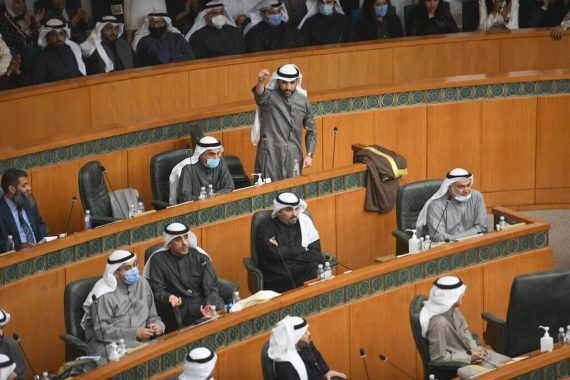Over a month ago, Kuwait concluded its parliamentary elections for the 16th legislative term. The governing structure in Kuwait differs from its Gulf neighbors as here the legislative branch, which is also known as the National Assembly, has significant influence not only in passing legislation but also by virtue of its oversight of the executive branch.
Although the outcome of the parliamentary elections might not have a direct effect on the region, this particular legislative term in Kuwait will be interesting to monitor for various reasons from its being the first parliament to be formed under the reign of the newly elected Emir, Sheikh Nawaf al-Ahmad al-Jaber al-Sabah, to the increasing pressure from the Kuwaiti people to reject normalization relations with Israel.
The outcome of the elections
On December 5, 2020, despite the COVID-19 pandemic restrictions and the bad weather, Kuwaitis showed up in high numbers; the election turnout was around 70 percent. Out of the 342 candidates running across five electoral districts, only 50 were elected to the parliament, ten from each district. The outcome of the elections yielded significant results, with more than a 60 percent turnover; only 19 of the 44 incumbents were re-elected to an all-male parliament.
Although Adel Al-Asoumi, the chairman of the Arab Parliament, congratulated Kuwait for holding a “transparent and successful election,” there were no official reactions from the five other Gulf Cooperation Council (GCC) countries following the election in Kuwait.
Role of Kuwaiti parliament in foreign affairs
While the parliament does not usually delve into matters of foreign affairs, it has the jurisdiction to propose and vote on laws that concern Kuwait in relation to other countries.
“There is no clear constitutional text that prevents the National Assembly from discussing foreign policy matters, but it is understood from the spirit of the constitution that the Emir handles the signing of international treaties and the relationships with other countries. However, the National Assembly theoretically can disapprove any treaty signed by the state,” Nabeel Nowairah, an independent analyst, told Politics Today.
“As an institution, the parliament does not have a huge role to play in Kuwait’s foreign policy but “individual MPs sometimes voice their opinion on certain matters happening in the region and take their own stance, occasionally coming off as provocative,” Daniel Tavana, postdoctoral fellow at the Council on Middle East Studies at Yale University, told Politics Today.
During the election cycle, the Palestinian cause was brought up multiple times, thus signaling that the topic is one of utmost priority for most Kuwaitis.
This was evident two weeks ago when a UK-based Emirati media outlet, Al Arab, published an article following the AlUla summit which was perceived as an insult towards the Kuwaiti Emir, as it took away from his role in resolving the Gulf dispute.
This prompted Kuwait’s Ministry of Foreign Affairs to contact its Emirati counterpart to express their concern. While the issue was resolved on a state level, MP Ahmed Al Hamad spoke out on the incident and pointed out that the newspaper has a “limited opinion and is ignorant regarding Kuwait’s role in mediating the Gulf crisis.”
Kuwaiti “House of the People”
As the branch of government that represents the voice of the Kuwaiti people, the parliament discusses matters related to the region when they are of national importance.
During the election cycle, the Palestinian cause was brought up multiple times, thus signaling that the topic is one of utmost priority for most Kuwaitis.
Indicating the importance of rejecting ties with Israel and although the parliament had been in session for about a month, normalization with Israel was regarded as a priority by the foreign affairs committee, with one of its members, MP Abdullah Al Mudhaf, stating that they aim to solidify the boycott of the Zionist state.
In terms of legislation, on December 26, Kuwaiti MP Dr. Abdulaziz Al Saqobi, submitted a proposal to amend Law 21 of 1964, related to the boycott of Israeli goods, to include that Israel should be boycotted politically, electronically, and in terms of tourism.
The parliament’s role as the “House of the People” was clearly visible during the previous legislative term when 38 MPs released a statement demanding that the Kuwaiti government acknowledge its commitment to rejecting ties with Israel, after news broke that the United Arab Emirates had agreed to normalize ties with Israel.
The move came after the Kuwaiti people loudly voiced their support for the Palestinian people and 40 civil society organizations urged the parliament to “urgently pass a law that criminalizes normalizing relations with the Zionist Enemy.”
The parliament’s role as the “House of the People” was clearly visible during the previous legislative term when 38 MPs released a statement demanding that the Kuwaiti government acknowledge its commitment to rejecting ties with Israel.
In Kuwaiti politics, going against the Palestinian cause is a red line, and MPs and politically active persons are expected to have a firm stance against Israel. Such figures are favored by the public. Marzouq Al-Ghanim, the speaker of parliament, gained notable attention during the Arab Parliament in Amman when he threw the “deal of the century” document in the trash, claiming that it “belongs in the dustbin of history.”
Given that Article 70 of the Kuwaiti constitution stipulates treaties must be approved by a law to be enforced, when Kuwait and Saudi Arabia reached an agreement on December 24, 2019 over the Neutral Zone, a 5,770-square meter oil production zone shared by both countries, the Memorandum of Understanding (MoU) was not deemed final without the approval of the parliament.
Recommended
While the law passed as the majority of the members approved the MoU, six MPs rejected it. One of the MPs who voted against the bill, Mubarak Al Hajraf, during the session asked, “Did this agreement bring about equal sovereignty between both countries?”
Several influential political figures and former MPs Obaid Al-Wasmi and Saleh Al-Mulla, spoke on the matter pointing to the fact that reaching an agreement is vital as long as it does not infringe on Kuwait’s sovereignty and wealth.
The Neutral Zone has been a topic of national interest since 2015 when both countries halted oil production in Kuwait’s Wafra and Saudi Arabia’s Khafji oil fields, after growing tension following the Saudis’ approval to grant Chevron a 30-year concession without consulting Kuwait. The move was not welcomed by Kuwait as the Kuwaiti constitution states that no foreign country is permitted ownership of any of its oil resources.
Siding with allies, yet maintaining diplomacy
Kuwait refrains from engaging in offensive military operations and tries to reduce regional tensions if they arise. Although this has been the governmental stance for decades, the parliament has played a role in reflecting public opinion regarding regional affairs.
One notable instance was back in 2016, when nine Shi’a MPs boycotted a parliamentary meeting which was scheduled to take place a day after 25 Kuwaitis were charged for allegedly having ties with Iran and Hezbollah. The incident caused polarization in Kuwait with some MPs calling for harsh measures on Iran, while others stating that the ruling was an indication of the increasing Saudi influence on Kuwaiti domestic issues.
Earlier in 2011, during the Bahraini uprising, there was internal pressure, including from the parliament, that Kuwait should refrain from establishing a military presence on the ground. Sticking to its diplomatic stance, the Kuwaiti government ended up sending naval forces and medical personnel.
Setting an example
Since Kuwaiti citizens have the right to vote for the members of the legislative branch (except the 16 ministers who are appointed by the government), the Gulf country’s semi-democratic process is argued to be one of the freest governing structures in the region.
“Although there is no regional standard, given that every Gulf country has its own electoral and legislative institutions, the Kuwaiti parliament is the only one that has some autonomy and real law-making power,” stated Tavana.
Kuwait’s democratic process sets an example for the region, not only as a body that enacts laws but also in terms of its ability to hold the government accountable.
The Kuwait parliament’s right to question ministers and put forth a vote of no-confidence, possibly removing a minister from his position if approved by a majority, is sometimes viewed as a concern to neighboring countries.
“Other GCC states may see this sometimes as a barrier because it is not only about getting the Emir’s approval on some of the issues,” Nowairah explained. Kuwait is considered the most democratic country in the Gulf, ranking 114 out of 167 countries according to the 2019 Democracy Index conducted by the Economist Intelligence Unit (EIU).
However, most recently, given the rising tensions between the government and the parliament, which led the government to submit its resignation a month after it was formed, all legislative duties have been halted until a new government is formed.
This pause is likely to last for a month or two, thus raising concerns about the volatile political environment. While the deadlock between the government and parliament has little direct effect on Kuwait’s neighbors, it puts the country at risk as its political instability makes it vulnerable.





